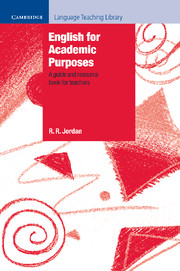Book contents
- Frontmatter
- Contents
- List of figures
- List of abbreviations
- Acknowledgements
- Introduction
- Part I English for Academic Purposes and study skills
- Chapter 1 EAP and study skills: definitions and scope
- Chapter 2 Needs analysis
- Chapter 3 Surveys: students' difficulties
- Chapter 4 EAP syllabus and course design
- Chapter 5 Evaluation: students and courses
- Chapter 6 Learning styles and cultural awareness
- Chapter 7 Methodology and materials
- Chapter 8 Evaluating materials
- Part II Study skills and practice (EGAP)
- Part III English for Specific Academic Purposes
- Appendices
- References
- Subject index
- Author index
Chapter 2 - Needs analysis
Published online by Cambridge University Press: 10 November 2010
- Frontmatter
- Contents
- List of figures
- List of abbreviations
- Acknowledgements
- Introduction
- Part I English for Academic Purposes and study skills
- Chapter 1 EAP and study skills: definitions and scope
- Chapter 2 Needs analysis
- Chapter 3 Surveys: students' difficulties
- Chapter 4 EAP syllabus and course design
- Chapter 5 Evaluation: students and courses
- Chapter 6 Learning styles and cultural awareness
- Chapter 7 Methodology and materials
- Chapter 8 Evaluating materials
- Part II Study skills and practice (EGAP)
- Part III English for Specific Academic Purposes
- Appendices
- References
- Subject index
- Author index
Summary
In broad terms, needs analysis can be described as:
the process of determining the needs for which a learner or group of learners requires a language and arranging the needs according to priorities … [it] makes use of both subjective and objective information.
(Richards et al. 1992)The various dimensions involved in analysing needs can be seen in the following imaginary, but plausible, case study.
An imaginary case study (1)
Gopal, a young man from Nepal, wants to go to a university in the UK to study for an MA in Economics. His sponsor, the Ministry of Finance, wants Gopal to study Development Economics, thinking that this might be more advantageous to the needs of a developing country. Gopal's opinion is not asked; he is told that a financial award is only available for Development Economics. Naturally he agrees, and is delighted to have the opportunity of studying abroad: he has not been outside Nepal before. He hopes that he will go to University 1 where his friend went and was happy.
Gopal is asked to take a British Council English Test (IELTS test from UCLES) in their office in the capital, Kathmandu. He does so, feeling fairly confident of the outcome as he has been studying and using English for some years. Rather to his surprise, he is told that he needs a pre-sessional English course for eight weeks before his academic course begins.
- Type
- Chapter
- Information
- English for Academic PurposesA Guide and Resource Book for Teachers, pp. 20 - 42Publisher: Cambridge University PressPrint publication year: 1997
- 1
- Cited by



